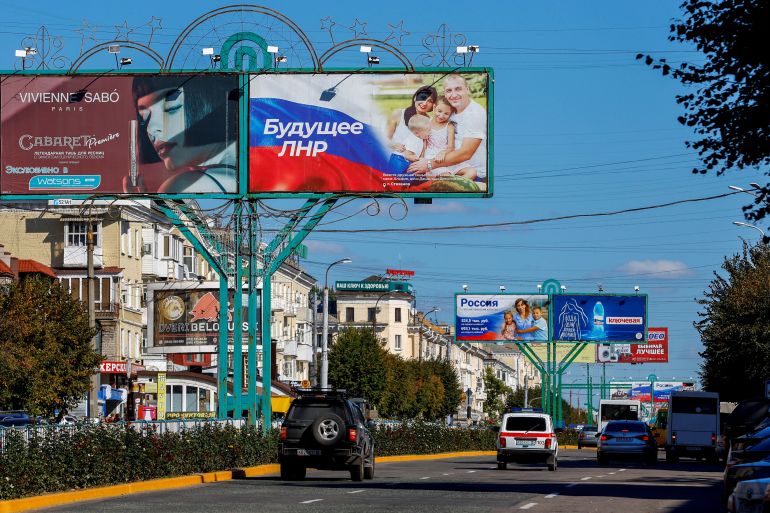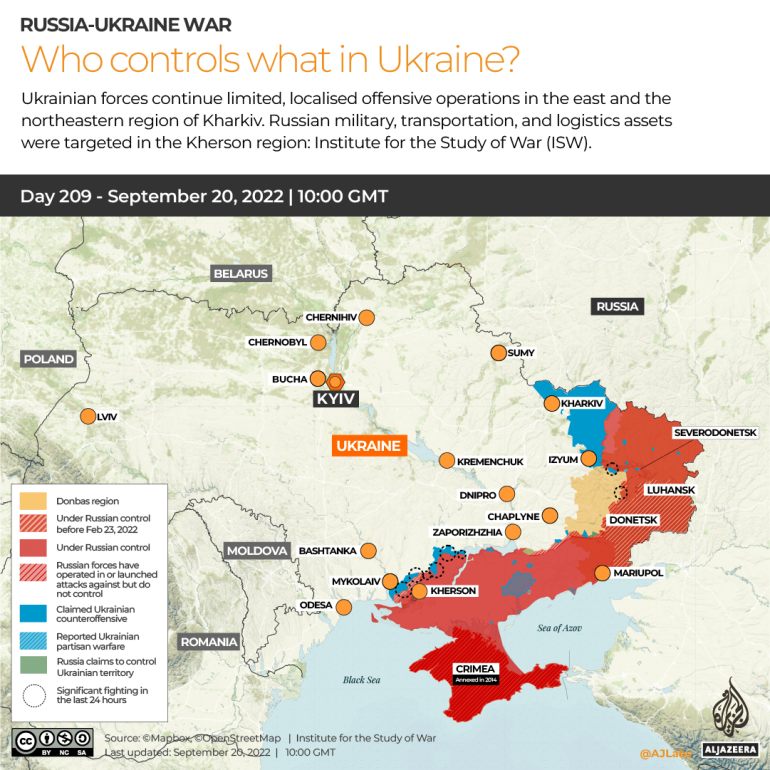Russian-backed separatists in Ukraine plan annexation votes
Ukraine and its allies condemn plans for referendums amid concern it risks an escalation of the seven month crisis that began with Russia’s invasion.

Officials in four Russian-controlled regions in eastern and southern Ukraine have said they will hold referendums on becoming part of Russia, which could set the stage for Moscow to escalate its seven-month-old war.
The officials said the votes would start on September 23 and continue until September 27.
Keep reading
list of 4 itemsUkraine troops focus on Donbas ‘de-occupation’ from Russia
Russian separatists in Luhansk convict ex-OSCE staff of treason
Missile hits near atomic plant; Zelenskyy says Russia ‘panicking’
Ukraine dismissed the plan as a stunt by Russia to try to reclaim the initiative after crushing losses on the battlefield.
“Sham ‘referendums’ will not change anything,” tweeted Ukraine’s Foreign Minister Dmytro Kuleba.
“Russia has been and remains an aggressor illegally occupying parts of Ukrainian land. Ukraine has every right to liberate its territories and will keep liberating them whatever Russia has to say.”
Votes will take place in the self-proclaimed Donetsk and Luhansk republics of the Donbas region, which Russian President Vladimir Putin recognised as independent shortly before sending troops into Ukraine in February, according to officials and news agencies.
A vote will also be held in the southern Kherson region that Moscow’s troops captured in the early days of Russia’s offensive in Ukraine, and in the partly Russian-controlled Zaporizhia region.
Russia does not fully control any of the four regions, with only about 60 percent of the Donetsk region in Russian hands.

Asked about the referendums, Russian Foreign Minister Sergey Lavrov said: “From the very start of the operation … we said that the peoples of the respective territories should decide their fate, and the whole current situation confirms that they want to be masters of their fate.”
The integration of the regions into Russia would represent a significant escalation of the conflict in Ukraine, as Moscow would be able to claim it is defending its own territory from Ukrainian forces.
“All this talk about immediate referendums is an absolutely unequivocal ultimatum from Russia to Ukraine and the West,” Tatiana Stanovaya, founder of the political analysis firm R.Politik told the Reuters news agency.
Gathering at the United Nations for the organisation’s annual meeting, Ukraine’s Western allies condemned the latest Russian plan.
US Secretary of State Antony Blinken dismissed the referendums as a “sham” and noted reports that Russia was preparing to call up more reserves.
“None of this – the sham referenda, the potential mobilisation of additional forces – is a sign of strength. On the contrary, it’s a sign of weakness. It’s the sign of Russian failure,” he told reporters after a meeting with British Foreign Secretary James Cleverly in New York.
Canada and the European Union were also among those condemning the planned votes, with French President Emmanuel Macron saying any vote would be legally meaningless.
“I think what Russia announced is a travesty,” he told reporters at the United Nations General Assembly (UNGA), calling it a “new provocation” that “will have no consequence on our own position”.
“The very idea of organising referendums in regions witnessing war, which are suffering bombings, is the height of cynicism,” Macron said.
‘Further escalation’
The officials in areas amounting to 15 percent of Ukrainian territory — an area about the size of Hungary or Portugal — announced the votes in what appeared to be a choreographed move.
“The People’s Council ruled … to set the days of the referendum for September 23 to September 27,” separatist official Denis Miroshnichenko said as quoted by a Luhansk news portal.
Shortly after, the official Donetsk News Agency announced that a referendum would be held in its territory on the same dates.
In a separate statement, the leader of the Donetsk rebel group, Denis Pushilin, asked Putin to consider the region becoming part of Russia “as soon as possible”.
“The long-suffering people of Donbas deserve to be part of the Great Country, which they always considered their Motherland,” Pushilin said on social media.
“I am sure that the entry of the Kherson region into the Russian Federation will secure our territory and restore historical justice,” the Moscow-appointed head of that region, Vladimir Saldo, said in a statement on Tuesday announcing the September vote.
He added that it was a “necessary decision in the face of constant acts of terror by the armed forces of Ukraine and NATO member countries that supply weapons to kill civilians on our soil”.
Russian forces control about 95 percent of Ukraine’s Kherson territory in the south of the country.
The head of the Russian-installed administration in Zaporizhia, Yevgeny Balitsky, said on Telegram: “Today I signed an order on the holding of a referendum on the territorial allegiance of the region” from September 23 to 27.
The US ambassador to the UN, Linda Thomas-Greenfield, told Al Jazeera that the annexation referendums “will not be recognised by anyone in the international community”.
At #UNGA, @USAmbUN tells @AJEnglish that annexation referendums in Donetsk and Luhansk "will not be recognized by anyone in the international community," and says until #Russia withdraws from #Ukraine, "it's going to be very difficult to have meaningful diplomacy with them." pic.twitter.com/pPDMgaYXR9
— Amanda Price (@amandaruthprice) September 20, 2022
NATO Secretary General Jens Stoltenberg condemned the plans by Russian-backed forces, warning that they were yet another escalation in the war brought on by the Kremlin.
“Sham referendums have no legitimacy and do not change the nature of Russia’s war of aggression against Ukraine. This is a further escalation in Putin’s war,” he wrote on Twitter.
“The international community must condemn this blatant violation of international law and step up support for Ukraine,” he added.
The Kremlin has repeatedly said the issue is a matter for the local Russian-installed officials and citizens of the regions to decide.
Dmitry Medvedev, the former Russian president who is now deputy chairman of the Russian Security Council, backed the referendums, which he said would change the path of Russian history and allow the Kremlin more options for defence of what he said would become Russian territory.
“Encroachment onto Russian territory is a crime which allows you to use all the forces of self–defence,” Medvedev said in a post on Telegram. “This is why these referendums are so feared in Kyiv and the West.”
Russia’s nuclear doctrine allows the use of such weapons if weapons of mass destruction are used against it or if the Russian state faces an existential threat from conventional weapons.
Large parts of the industrial Donbas area have been controlled by Moscow-backed separatists since 2014, after nationwide demonstrations brought down Ukraine’s Kremlin-friendly president.
Russia also annexed the Crimean Peninsula from Ukraine with a vote that was criticised by Kyiv and the West, which imposed sanctions in response.